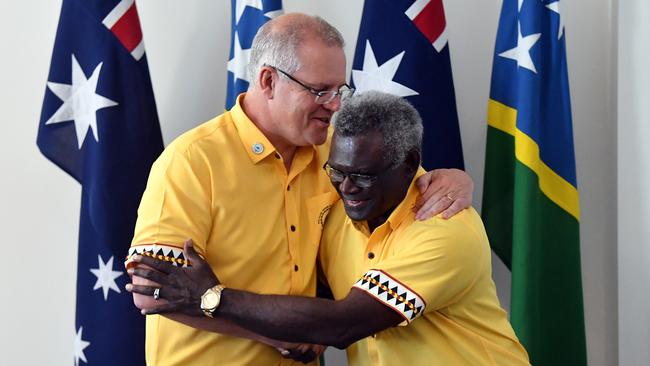We can’t control Solomons but can build stronger ties
Agreements are becoming commonplace between Pacific governments and Beijing, and always read as if entirely drafted by the latter, with the Pacific parties merely appending their signatures.

Such speculation about China building a naval base in Solomon Islands is “very insulting”, Prime Minister Manasseh Sogavare has told his parliament. But he loves it. It’s the bread and butter of his style of politics, which holds a special appeal and a winning track record in the Solomons.
“We are not pressured in any way by our new friends,” Sogavare said about the draft framework agreement on security co-operation leaked to New Zealand academic Anna Powles, an expert on geopolitics and security in the Pacific region.
Sogavare resented the region being considered “the backyard of big Western powers”, with the US now establishing an embassy in this backyard, in Honiara. Critics of the China deal are “lunatics”, he said.
The rhetoric is indicative. Sogavare follows in the culturally unique footsteps of his best-known predecessor, Solomon Mamaloni, who was the first chief minister before independence from Britain in 1978 and then served as prime minister three times in the 1980s and ’90s.
Sogavare, like Papua New Guinea Prime Minister James Marape, is a Seventh-day Adventist. The first political party he led was the People’s Progressive Party. Then he formed the Social Credit Party, named for a New Zealand party whose leader had hosted Mamaloni in his home.
After that came the Democratic Coalition for Change, followed by the present four-party Democratic Coalition for Advancement. At the previous election, in 2019, Sogavare stood as an independent. He is pressing for the next election to be postponed from next year to 2024 because of the exigencies of the country hosting the Pacific Games in 2023. His fellow parliamentarians are expected to agree.
Sogavare is in his fourth term as Prime Minister. Both he and Mamaloni enjoyed rapid success in public service careers before shifting to politics. Like Mamaloni, Sogavare has cultivated an image of being enigmatic, unpredictable, to a degree even mysterious and aloof. This has been leveraged into an especially Solomons style of nationalism.
The tone of the rhetoric and the prickly nationalism are effective in rallying parliamentary support, to a degree. The further and crucial step in winning key votes comprises leveraging this sense of being on the right side through astutely timed and quantified material support for individual MPs.
Creating economic opportunity and delivering government services including health and education effectively and fairly are not at the front of mind in this political game where winner takes all. That’s just as well since Solomon Islands ranks 151st of the 189 countries on the UN’s Human Development Index – and it’s not attributable only to British colonial neglect, now several decades ago. Fiji leads the Pacific at 93rd while close neighbours Vanuatu ranks 140th and PNG is even lower at 155th. The Solomons’ gross national income per person is only just over half that of PNG.
To succeed politically in the Solomons, as in quite a few Pacific countries, one has to win a personal seat first. But then core political cunning is required to pull together like a puppet master the strings that will induce sufficient parties and independents to create a parliamentary majority.
That process, and then staving off or winning consequent parliamentary votes of confidence, is what counts. The only effective way to participate for any outsider who wants a say in the result tends to come through inducements.
This all builds considerable layers of difficulty to gain influence for transparent democracies with strong anti-corruption controls and mores.
And in the current Pacific circumstances this is made harder in part because of some Australian rhetoric. Keeping China out is not best achieved by publicly casting a core aim of the policy as “keeping China out”. This does not play well in the Pacific where, as everywhere, people prefer to be valued for themselves.
As China rapidly began to invest heavily in building a major role in the Pacific in the past few years, Canberra belatedly introduced its “step up”. Sadly, this is not going as well as hoped.
China continues to advance its interests in the islands – including through developing a diplomatic cohort focused on the region through serial crosspostings – while Australia still fails to build on our real strengths and long-term relationships, many of which derive from outside Canberra – in the business world, in people-to-people links including sport and the churches, and in education.
Although our own aid too often fails to hit the mark, it understandably frustrates Canberra – which tends to view Chinese aid as superficial and self-serving – that impressive-sounding agreements are becoming commonplace between Pacific governments and Beijing, and always read as if entirely drafted by the latter, with the Pacific parties merely appending their signatures.
Australia has to accept that Sogavare is the kind of leader Beijing likes to deal with, and that Canberra can’t control, and that the Solomons is especially vulnerable to Chinese deals. But in past decades myriad investors, opportunists and, yes, even countries have believed they have cleverly outmanoeuvred Pacific partners to achieve their own aims, only to come up empty-handed.
Australia’s own course towards longer-term success in and with the islands requires persistence, more intense and more broadbased commitment, and staying true to our values as well as our interests. It will lose out from time to time, including in the Solomons, but that feared Chinese base is very distant indeed from realisation as our prime loss.
Rowan Callick is an Industry Fellow at Griffith University’s Asia Institute.




A spectacular image is being conjured: a nest of submarines secreted in caves deep beneath a Pacific island, while in the bright tropical sun above the base, proudly fluttering over coconut palms, flies a red flag with five golden stars.